By Eric Vandenbroeck
and co-workers
It’s not just about Moscow and Kyiv but
the entire Russia-West relationship.
The protracted war in
Ukraine is entering a new and potentially much more dangerous phase. The
surprising success of Ukraine’s offensive to
retake territory Russia
seized since its invasion in February has left Russian President Vladimir Putin
with precious few choices to
turn the tide of war.
In his September 21
speech about the steps he was taking to win his war in Ukraine, Russian
President Vladimir Putin had to explain why he had not already won. The culprit was NATO,
which he faulted for its considerable support to Kyiv.
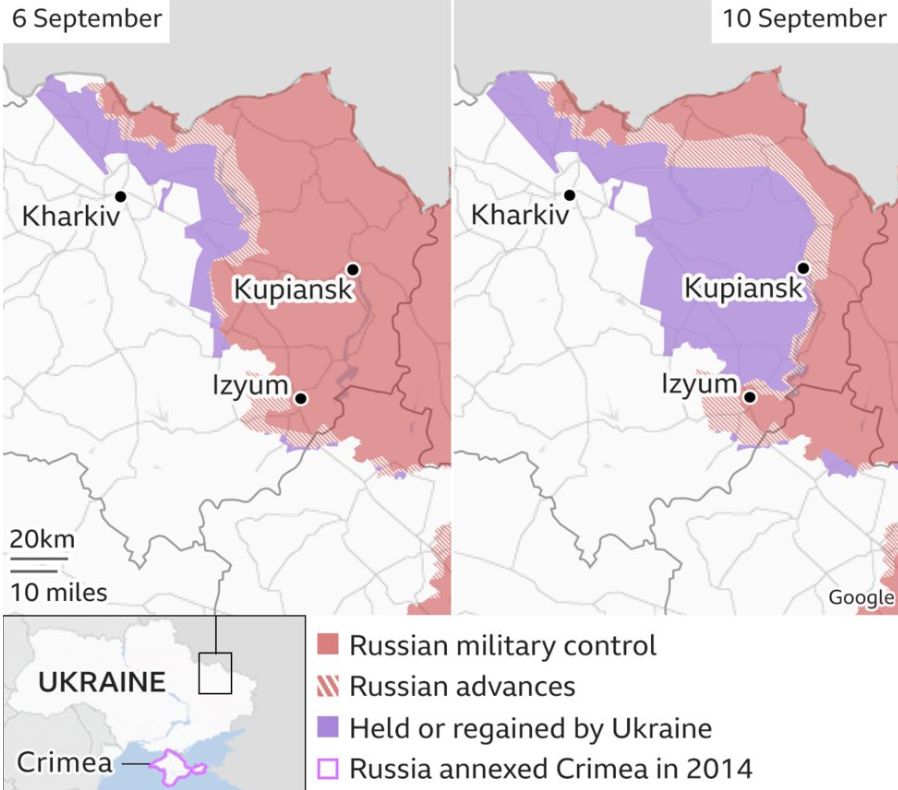
Following the sudden
breakthroughs by Ukrainian troops in Kharkiv in
September, the Kremlin is now
climbing the escalation ladder. Russian President Vladimir Putin ordered a
Russian military
mobilization on
Sept. 21 while issuing yet another semi-veiled threat of the use of nuclear
weapons, a return to one of Moscow’s themes following earlier defeats in the
initial stages of the invasion. Referendums to join Russia in several
Moscow-backed separatist
territories, which
have long been discussed and are currently being held, are yet another sign of
the Kremlin’s attempts to ratchet up pressure on Ukraine.
These developments
point to a severe risk of escalation in the Ukrainian conflict, which has
already bled over into energy disruptions between Russia and Europe and has
come worryingly close to threatening nuclear
accidents. But further
escalation isn’t inevitable. Indeed, they could provide the impetus for
something that has eluded the Russia-Ukraine conflict going back to 2014: an
earnest and dedicated attempt by all parties involved to reach a diplomatic
resolution to end the war in Ukraine—or at least mitigate against its most
destructive outcomes.
To be sure, there
have been many failed efforts at resolving the Ukrainian conflict
diplomatically. These go back to the start of the conflict in early 2014
following the Euromaidan revolution in Kyiv, Ukraine’s capital, Russia’s
subsequent annexation of Crimea, and sponsorship of a separatist uprising in
the Donbas. Diplomatic negotiations were then launched almost immediately.
These primarily came in two forms: the Trilateral Contact Group, which included
Ukraine, Russia, and the Organization for Security and Co-operation in Europe
to address the tactical and security components of the conflict, and the
so-called Normandy Four between Ukraine, Russia, France, and Germany to address
broader strategic issues from a political level.
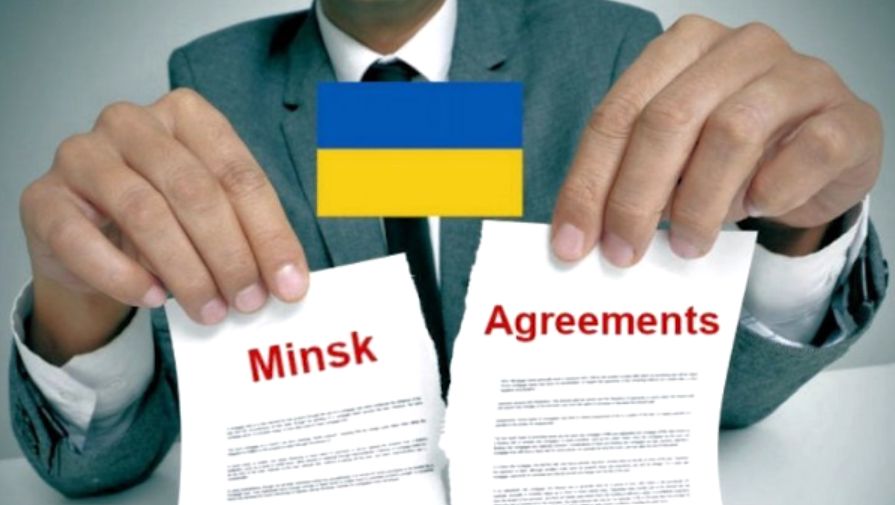
These mediation
efforts produced a roadmap agreement to end the Ukrainian conflict, known as
the Minsk
agreement, which included a
cease-fire and a pullback of forces from the line of contact. Still, no part of
this agreement was ever successfully nor sustainably implemented. Many issues
undermined its implementation, including Russia’s deliberately ambiguous status
as both a mediator and belligerent, as well as disagreements between Kyiv and
Moscow over the sequencing of the security and political components of the
protocol. At the core of the Minsk agreement’s failure was that its purpose was
used differently by each of the main parties, with Ukraine viewing it as a way
to reclaim territory seized by Russia. In contrast, Moscow viewed it as
undermining Kyiv’s Western integration efforts.
The Minsk agreements
were rendered entirely obsolete with Russia’s full-scale invasion of Ukraine on
Feb. 24. No longer was the status of the Donetsk and Luhansk People’s Republics
subject to negotiation; instead, Russia chose to recognize these territories as
independent states before launching an all-out military assault on Ukraine. The
Kremlin claimed this was necessary to protect these territories and achieve
broader “demilitarization
and denazification” of
Ukraine. This led to the current phase of the military conflict in Ukraine.
This phase has been negotiated mainly on the battlefield and now appears to be
on the precipice of escalating further.
d Russia, this does
not mean international mediation in the Ukrainian conflict has been futile.
There has been one such diplomatic effort in the current phase of the conflict
that has been not only agreed on and implemented by all parties involved
(including both Ukraine and Russia) but could also serve as a framework for
preventing the war from worsening.
That effort is known
as the Black Sea
Grain Initiative, an
international agreement involving Ukraine and Russia that Turkey mediated and
the United Nations. It was signed on Jul 22 and came into force on 1 Aug. This
agreement paved the way for a humanitarian maritime corridor for grain supplies
through the Black Sea and has allowed Ukraine and Russia to unlock food exports
that were obstructed as a result of the war. As the agreement has been
successfully implemented for more than a month or two, it has helped alleviate
economic pressures in Ukraine and food shortages worldwide, offering evidence
that practical collaboration can still be achieved between Kyiv and Moscow even
amid war.
A key player in
negotiating the agreement was Turkey, which has emerged as the most active and
effective mediator between Russia and Ukraine since the conflict
began. Turkey’s unique position as the only NATO member to not pass sanctions
against Russia and Ankara’s complex yet constructive relationship with Moscow
and Kyiv gave Ankara the political leverage to mediate between both sides. In
addition, Turkey’s strategic location on the Black Sea and its points of entry
from the Bosphorus to the Mediterranean Sea made it
crucial from a logistical perspective, as any shipments transiting the Black
Sea must pass through Turkish-held
straits to reach global
markets.
The U.N.’s role was
vital as it gave multilateral legitimacy to the agreement, particularly as the
Russia-Ukraine conflict has created global grain problems. Russia and Ukraine
collectively account for around 18 percent of global grain exports, providing the majority
of imported grains to many countries in Africa and the Middle East. However,
Russia’s military blockade of Ukraine’s Black Sea ports and Western sanctions
against Russia make it much more difficult for both countries to bring their
grain supplies to market. The war has not only impacted the price of grain and
led to rampant food inflation but also created grain shortages in some of the
world’s most vulnerable areas.
As a result, Ukraine
and Russia were incentivized to reach an agreement on grain supplies even as
the broader military conflict endured, paving the way for Turkey and the U.N.
to mediate. Since the Black Sea Grain Initiative was launched, nearly 200-grain
ship voyages have delivered more than 4 million metric tons of grain
products. Despite occurring during an active conflict, several factors
facilitated the grain agreement. It had clear incentives for Russia and Ukraine
to unlock their grain shipments, and it did not require either party to
compromise on their broader strategic interests. It also addressed concerns
from Turkey and the U.N. over tackling food shortages and inflation, and there
was buy-in among all parties for international observation and coordination
toward implementation. This allowed diplomacy to be pursued earnestly and for
the negotiators to focus on the technical details of a deal's legal and
logistical parameters while overcoming any political obstacles.
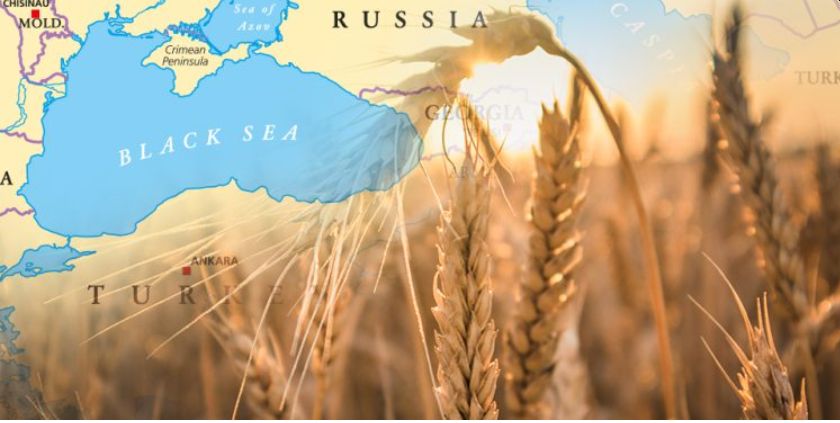
All of these factors
are important to remember when considering what a diplomatic agreement to
end—or at least mitigate against the escalation of—the conflict in Ukraine
could look like at this stage of the war. Like the Black Sea Grain Initiative
and unlike the Minsk agreement, any such agreement needs to have a common
purpose and one that all parties mutually agree on. Although there are
certainly no shortages of differences between Moscow, Kyiv, and the West, there
are common goals that all parties can still get around, even if those are just
to prevent a dramatic escalation that would hurt all sides. Such escalation
could take numerous forms, from a Russian nuclear weapons attack to a
full-scale energy cutoff to the economic and political crises such acts could
set off.
Thus, the Black Sea
Grain Initiative, with its focus on multilateral cooperation and identifying
and implementing common goals, could provide a practical conceptual framework
for preventing the escalation of the Ukrainian conflict. Turkey has made it no
secret that it wants to help mediate a broader cease-fire agreement between
Ukraine and Russia, with Ankara hoping that the experience of the grain deal—as
well as a more recent prisoner swap it mediated along with Saudi Arabia—can be leveraged
toward this objective. Successful mediation that produces tangible results,
even on relatively minor issues, can build the groundwork for future
de-escalation.
Of course, the
critical issues of territorial control and security guarantees are far more
challenging to mediate. Ukraine and Russia may eschew mediation efforts as
their forces attempt to gain an advantage on the battlefield. Nevertheless, the
latest developments have placed the Ukrainian conflict at a crossroads, with a
severe risk of escalation on the one hand and an opportunity for a diplomatic
climbdown on the other.
But the mobilization
he has announced will not turn this around, and the use of nuclear weapons would make a bad situation catastrophic. Putin
is on course to lose, and given the many thousands of lives already sacrificed,
he fully deserves to do so.
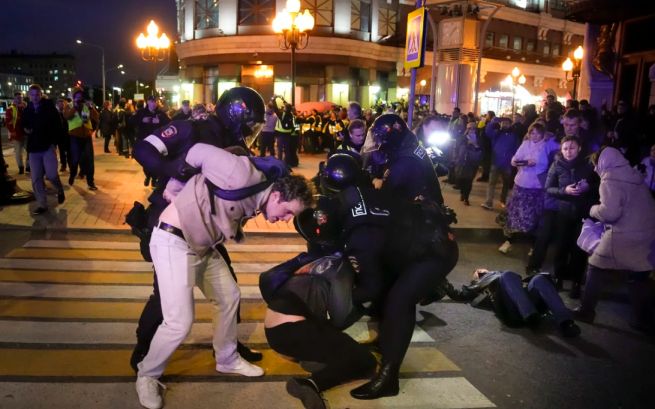
More than 2,000
people in total have been detained across Russia for protesting against
President Vladimir Putin’s partial military mobilization, including 798 people
arrested in 33 towns on Saturday, according to the independent monitoring group
OVD-Info.
Reuters reports that
frustrations spread to pro-Kremlin media, with one editor at the state-run RT
news channel saying problems such as call-up papers being sent to the wrong men
were “infuriating people.”
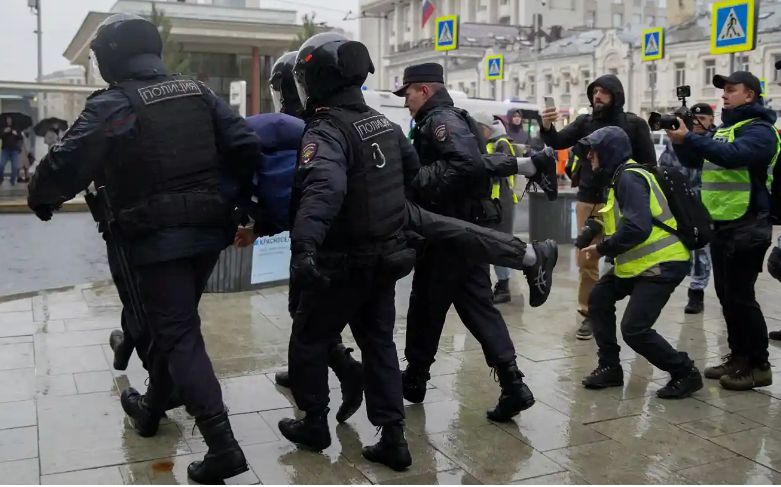
The Kremlin’s supporters
have criticized military call-up, something unheard of in Russia since its
‘special military operation’ in Ukraine began.
Valentina Matviyenko, the chairwoman of Russia’s upper house, the
Federation Council, said she was aware of reports of men who should be
ineligible for the draft called up.
“Such excesses are
unacceptable. And, I consider it right that they are triggering a sharp
reaction in society,” she said in a post on the Telegram messaging app.
For updates click hompage here